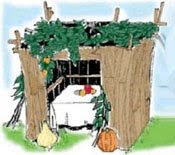JATIMÁ TOVÁ
Yom Kippur, the Day of Atonement, is the most sacred of the Jewish holidays, the "Sabbath of Sabbaths."
By Yom Kippur the 40 days of repentance, that begin with the first of Elul, have passed. On Rosh Hashanah
G-d has judged most of mankind and has recorded his judgement in the Book of Life. But he has given a 10 day reprieve.
On Yom Kippur the Book of Life is closed and sealed. Those that have repented for their sins are granted a good and happy New Year.
Since Yom Kippur is the day to ask forgiveness for promises broken to G-d, the day before is reserved for asking forgiveness for broken promises between people, as G-d cannot forgive broken promises between people.

Yom Kippur is a day of "NOT" doing. There is no blowing of the Shofar and Jews may not eat or drink, as fasting is the rule. It is believed that to fast on Yom Kippur is to emulate the angels in heaven, who do not eat, drink, or wash.
The Five Prohibitions of Yom Kippur
Eating and drinking
Anointing with
perfumes or lotions
Marital relations
Washing
Wearing leather shoes
While Yom Kippur is devoted to fasting, the day before is devoted to eating. According to the The Talmud the person "who eats on the ninth of Tishri (and fasts on the tenth) , it is as if he had fasted both the ninth and tenth." Prayer is also down played so that Jews can concentrate on eating and preparing for the fast.
On the eve of Yom Kippur the community joins at the synagogue. Men put on prayer shawls (not usually worn in the evenings). Then as the night falls the cantor begins the "Kol Nidre", it is repeated 3 times, each time in a louder voice. The Kol Nidre emphasizes the importance in keeping vows, as violating an oath is one of the worst sins.
An important part of the Yom Kippur service is the "Vidui" (Viduy) or confession. The confessions serve to help reflect on ones misdeeds and to confess them verbally is part of the formal repentance in asking G-d's forgiveness. Because community and unity are an important part of Jewish Life, the confessions are said in the plural (We are guilty).
As Yom Kippur ends, at the last hour a service called "Ne'ila" (Neilah) offers a final opportunity for repentance. It is the only service of the year during which the doors to the Ark (where the Torah scrolls are stored) remain open from the beginning to end of the service, signifying that the gates of Heaven are open at this time.
The service closes with the verse, said 7 times, "The L-rd is our G-d." The Shofar is sounded once and the congregation proclaim - "Next year in Jerusalem."
Yom Kippur is over.
 Halloween is one of the oldest holidays with origins going back thousands of years. The holiday we know as Halloween has had many influences from many cultures over the centuries. From the Roman's Pomona Day, to the Celtic festival of Samhain, to the Christian holidays of All Saints and All Souls Days.
Halloween is one of the oldest holidays with origins going back thousands of years. The holiday we know as Halloween has had many influences from many cultures over the centuries. From the Roman's Pomona Day, to the Celtic festival of Samhain, to the Christian holidays of All Saints and All Souls Days.



